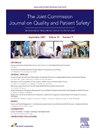Health Care Workers’ Trust in Leadership: Why It Matters and How Leaders Can Build It
IF 2.4
Q2 HEALTH CARE SCIENCES & SERVICES
Joint Commission journal on quality and patient safety
Pub Date : 2025-01-01
DOI:10.1016/j.jcjq.2024.09.002
引用次数: 0
Abstract
Background
Rebuilding patient trust in the US health care system has received considerable attention recently, but there has been little focus on health care workers’ (HCWs) trust in the leaders of health care delivery organizations. This study explores (1) the professional impact on HCWs of trusting the leaders of the organizations where they work and (2) the leadership actions that build HCWs’ trust.
Methods
The authors examined these questions using a survey that was crowdsourced to 353 HCWs through social media posts and e-mails from national health organizations. For each open-ended question, qualitative codes were identified, iteratively finalized, and applied to each response. Descriptive statistics were used to analyze the closed-ended questions and examine how often each qualitative code was raised.
Results
One in five (20.2%) HCWs trusted leadership “very much,” more than a third (36.9%) trusted “somewhat,” and 42.9% had lower levels of trust. Almost all (97.7%) reported that the degree of trust they had in their organization's leadership affected them professionally. Among HCWs who trusted their organization's leadership, the most common impact was feeling professional satisfaction, followed by providing higher-quality work. HCWs described three main ways health care organization leaders earned their trust: communicating effectively (being transparent and soliciting HCWs’ input), treating HCWs well (with respect and kindness and providing good compensation), and prioritizing patient care.
Conclusion
The findings suggest health care organizations would benefit from leaders seeking to earn HCWs’ trust. With trust in leadership, HCWs report higher work quality and greater professional satisfaction.
医护人员对领导的信任:为什么重要以及领导者如何建立信任》(Why It Matters and How Leaders Can Build It.
背景:最近,重建患者对美国医疗系统的信任受到了广泛关注,但很少有人关注医护人员(HCWs)对医疗机构领导的信任。本研究探讨了:(1)医护人员信任其工作所在机构的领导对其职业产生的影响;(2)建立医护人员信任的领导行为:作者通过社交媒体帖子和国家卫生组织的电子邮件向 353 名医护人员进行了众包调查,对这些问题进行了研究。对于每一个开放式问题,作者都确定了定性代码,并对每一个回答进行了反复修改。使用描述性统计对封闭式问题进行分析,并研究每个定性代码的出现频率:五分之一(20.2%)的医护人员 "非常信任 "领导,超过三分之一(36.9%)的医护人员 "比较信任 "领导,42.9%的医护人员对领导的信任度较低。几乎所有(97.7%)的医护人员都表示,他们对组织领导的信任程度会影响到他们的职业发展。在信任其组织领导的医护人员中,最常见的影响是感到职业满意,其次是提供更高质量的工作。医护人员描述了医护组织领导赢得信任的三种主要方式:有效沟通(透明并征求医护人员的意见)、善待医护人员(尊重和善待并提供良好的报酬)以及优先考虑患者护理:研究结果表明,医疗机构的领导者应努力赢得医护人员的信任。有了对领导层的信任,医护人员的工作质量会更高,职业满意度也会更高。
本文章由计算机程序翻译,如有差异,请以英文原文为准。
求助全文
约1分钟内获得全文
求助全文
来源期刊

Joint Commission journal on quality and patient safety
HEALTH CARE SCIENCES & SERVICES-
CiteScore
3.80
自引率
4.30%
发文量
116
审稿时长
49 days
 求助内容:
求助内容: 应助结果提醒方式:
应助结果提醒方式:


